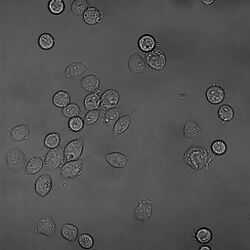Biology:RBL cells
From HandWiki
RBL (Rat Basophilic Leukemia cells)[1] are cancerous basophil cells that are well suited for the study of allergies.[2]
Uses
RBL cells are used in allergy studies due to the strong response of the cells to IgE and its FcεRI receptor. They are used in place of mast cells due to a higher stability in tissue culture.[3] RBL cells can also be humanized, aiding in the specificity of allergy studies to human patients.[4]
Infections
Mycoplasma bacterial infections greatly affects the cell mediator release for biological assays, therefore regular Mycoplasma tests need to be performed since the bacteria colonizes the cell surface and cannot be visualized through a light microscope.[citation needed]
References
- ↑ Bingham, B.R.; Monk, P.N.; Helm, B.A. (1994). "Defective Protein Phosphorylation and Ca2+ Mobilization Linowa SecretingVariant of the Rat Basophilic Leukemia Cell Line". The Journal of Biological Chemistry 269 (30): 19300–19306. doi:10.1016/S0021-9258(17)32167-1.
- ↑ Yoo, Jae-Myung (1 January 2014). "Anti-Allergic Action of Aged Black Garlic Extract in RBL-2H3 Cells and Passive Cutaneous Anaphylaxis Reaction in Mice". J Med Food 17 (1): 92–102. doi:10.1089/jmf.2013.2927. PMID 24456359.
- ↑ Wang, Weimin (2012). "Anti-allergic activity of emodin on IgE-mediated activation in RBL-2H3 cells". Pharmacological Reports 64 (5): 1216–1222. doi:10.1016/S1734-1140(12)70917-9. ISSN 1734-1140. PMID 23238477. http://if-pan.krakow.pl/pjp/pdf/2012/5_1216.pdf.
- ↑ Falcone, F.H (2015). "Use of Humanized Rat Basophilic Leukemia Reporter Cell Lines as a Diagnostic Tool for Detection of Allergen-Specific IgE in Allergic Patients: Time for a Reappraisal?". Curr Allergy Asthma Rep 15 (67): 67. doi:10.1007/s11882-015-0568-3. PMID 26452547.
External links
 |


